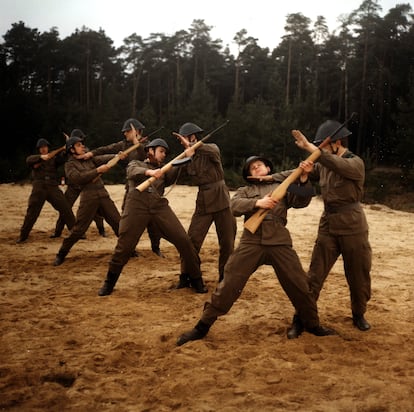My night as an East German cop
A little vodka helps reenact a Cold War drama playing a Volkspolizei police officer

I never had a particular interest in the VoPos (Volkspolizei), an infamous and brutal police force in the former German Democratic Republic (GDR), until I had to play the role of one. Thankfully, that page in history has turned. Due to my deep fascination with World War II, I have always felt quite disconnected from what followed — the occupation and division of Germany, the Cold War, the Wall, Checkpoint Charlie, Walter Ulbricht, Le Carré, and more. Honestly, that period seemed somewhat gray, duplicitous and lacking in grandeur, despite characters like George Smiley, Tom Hanks and Anik Lapointe. The last German policeman that captured my interest was author Philip Kerr’s detective, Bernie Gunther, (both sadly deceased). Gunther was a morally upright man, who unfortunately served under the Nazis, much to his regret. Screw Markus Wolf (the East German superspy), said Gunther. Screw the Stasi secret police. Screw all those people who made life impossible for East Germans.
Putting on a VoPo uniform got me interested in East German police again. See how important it is to approach history through the right door? To spice things up at the end of the summer when boredom sometimes takes over, I decided to dress up as a GDR police officer for one of the performances we put on at the Viladrau Club (northeast Spain). We came up with a sketch resurrecting the long-gone Volkspolizei, with a storyline about infiltrations, poisonings, and the destabilization of Western democracy. It may sound strange or even silly, but trust me, you haven’t experienced the end of summer in Viladrau.
We eagerly plunged into production, fully embracing our roles. Arola became the one-eyed female Stasi agent Lieutenant Nina Hagen, while Evelio and I played rude VoPos (a certain Captain Antonov, Erich Honecker’s well-connected nephew, and Major Cacaseno, a former Olympic swimmer). We assembled our costumes of Volkspolizei uniforms, helmets, Luger pistols and dug up some old GDR and Soviet flags. The only thing missing was an East German Trabant 601 car. Our set featured a Berlin Wall of bricks and barbed wire, along with a photo of the consensual kiss between Brezhnev and Honecker (with no allusions to current FIFA-related events.) The soundtrack featured the GDR national anthem along with select tracks by Rammstein and Pink Floyd’s The Wall.
Our performance, which came after The Lion King, was mostly witnessed by an audience who hadn’t been born when the Berlin Wall fell. It left everyone amazed and even brought some children to tears. Adding to the spectacle was our accidental consumption of vodka instead of water from a prop bottle, which lubricated the dialogue and paid homage to Bertolt Brecht. This unexpected twist made the Cold War era come to life! The climax of the show featured my laborious reenactment of VoPo soldier Hans Conrad Schuman’s iconic defection over the Berlin Wall in 1961. The enigmatic nature of our performance cast a pall over the club assembly the next day, perhaps even influencing the selection of the new president.
In any case, by dressing up as a VoPo, I had the privilege of glimpsing a bygone era. Now, it’s time for a stunning revelation. Once upon a time, way back in 1977, I found myself being interrogated by two Volkspolizei officers, their machine guns pointed directly at me. This encounter took place aboard a train crossing East Germany en route to Poland. Perplexed by my strange journey across the Iron Curtain accompanied by a mime named Ricard Sierra, I looked very suspicious to them. How astonished they would have been to witness my transformation, years later, as one of their own!
Sign up for our weekly newsletter to get more English-language news coverage from EL PAÍS USA Edition
Tu suscripción se está usando en otro dispositivo
¿Quieres añadir otro usuario a tu suscripción?
Si continúas leyendo en este dispositivo, no se podrá leer en el otro.
FlechaTu suscripción se está usando en otro dispositivo y solo puedes acceder a EL PAÍS desde un dispositivo a la vez.
Si quieres compartir tu cuenta, cambia tu suscripción a la modalidad Premium, así podrás añadir otro usuario. Cada uno accederá con su propia cuenta de email, lo que os permitirá personalizar vuestra experiencia en EL PAÍS.
¿Tienes una suscripción de empresa? Accede aquí para contratar más cuentas.
En el caso de no saber quién está usando tu cuenta, te recomendamos cambiar tu contraseña aquí.
Si decides continuar compartiendo tu cuenta, este mensaje se mostrará en tu dispositivo y en el de la otra persona que está usando tu cuenta de forma indefinida, afectando a tu experiencia de lectura. Puedes consultar aquí los términos y condiciones de la suscripción digital.









































